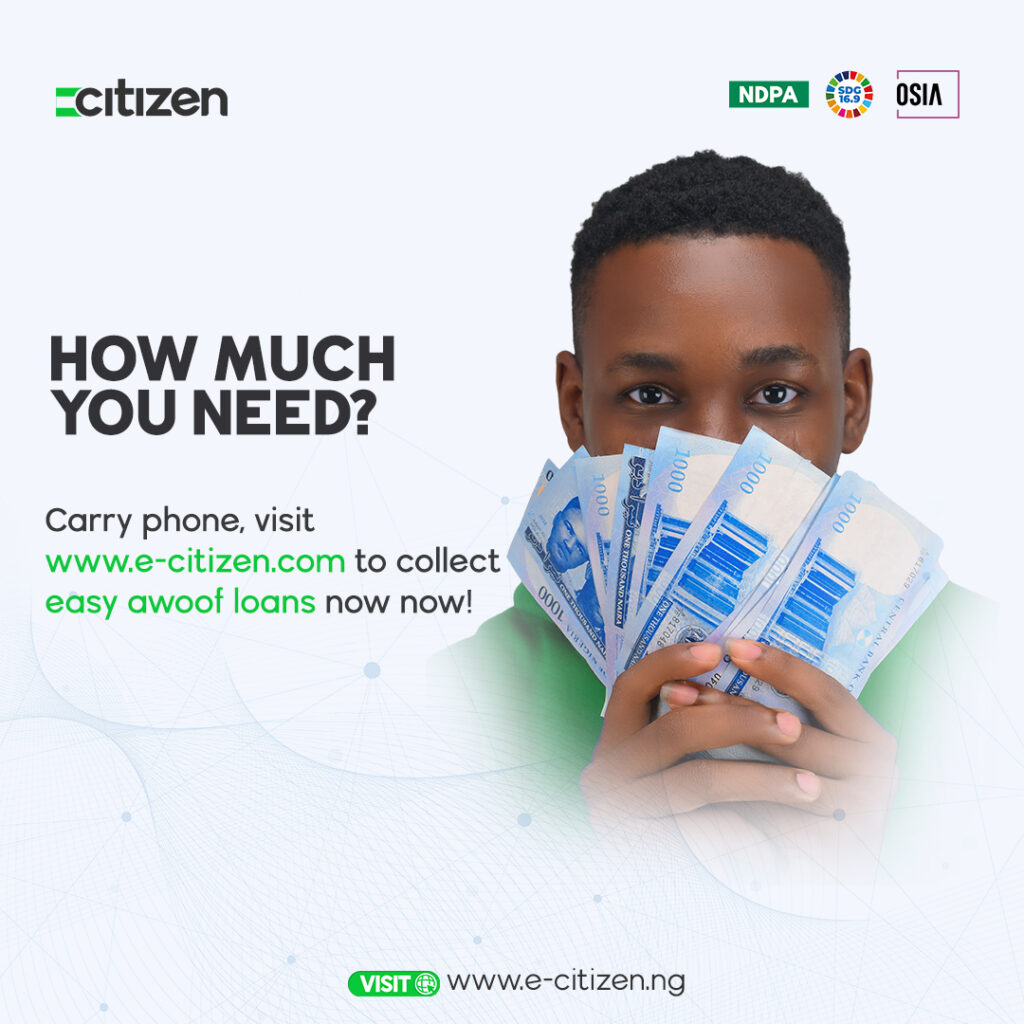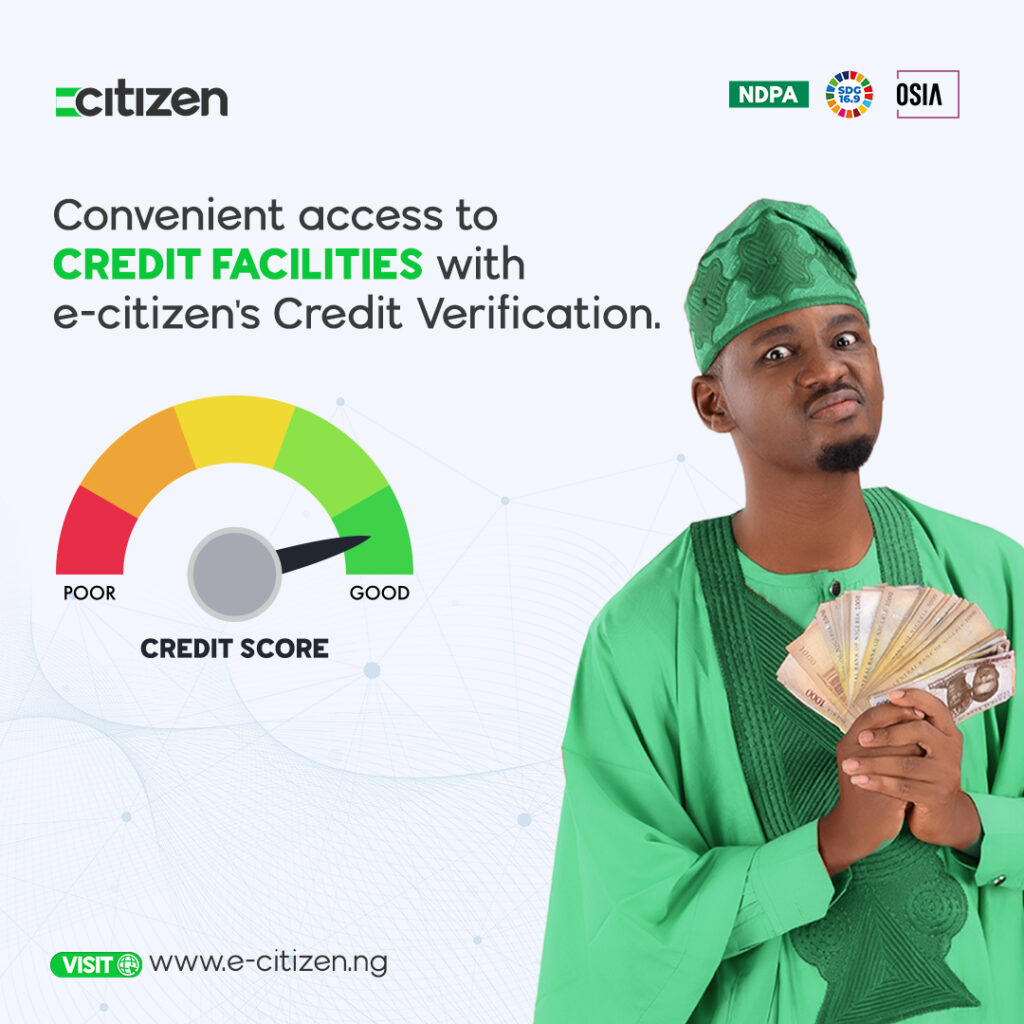There are three registered agencies in Nigeria responsible for recording and managing credit scores: CRC Credit Bureau, FirstCentral Credit Bureau Limited, and CreditRegistry. Financial institutions are by law required to keep financial transaction records of individuals and organisations with two out of the three credit bureaus. This can, unfortunately, lead to non-synergy of information in each agency. To get an accurate picture of your credit score/history, you may need to check all three credit agencies.
Checking your credit score in Nigeria can seem difficult. This article looks into how to check your credit score in Nigeria, recommending a user-friendly platform that allows you to know your creditworthiness for a small fee.
e-citizen is a mobile app that facilitates seamless identity verification for people and businesses in Nigeria. It offers instant credit score checks to users more easily than ever. To use their credit reporting platform, you’ll need to go to e-citizen.ng or install the e-citizen mobile app on your smartphone from the Google Play Store or Apple App Store.
How credit score works in Nigeria
Nigeria’s credit rating system is similar to that of other countries. It contains three numbers, ranging from 300 to 850, which indicate an individual’s creditworthiness.
Your credit score determines your suitability for financial credit, ranging from excellent to bad, as described below.
- 720 and above: Excellent
- 690 to 719: Good
- 630 to 689: Fair
- 300 to 629: Bad
The lower your credit score, the greater risk you pose to lenders, making them more likely to decline your loan/credit application.
Factors that determine your credit score
- 1. Constant credit usage: Multiple loan or credit applications can negatively affect your credit score. It demonstrates that you’re experiencing financial challenges and might be unable to pay your debt. We recommend spacing out credit applications so that you won’t affect your creditworthiness.
- 2. Indebtedness: If you frequently have outstanding debts, they are part of the major reasons why you have a bad credit score. This act simply means that you cannot manage your finances, and can be a potential risk to lenders.
Moreover, late payments of debts can significantly affect your credit score and make you less creditworthy.
Why you should build a strong credit score
Financial institutions and corporate lenders will typically use your credit score to determine whether they can grant you credit and the amount they can risk giving you.
Below are several reasons to maintain a good credit score in Nigeria:
- Easy access to credit and loans – A good credit score allows you to get a loan more easily. It also qualifies you for a mortgage, car loan, or product purchase via the Buy Now Pay Later (BNPL) financing option from Easybuy, CredPal, or PayFlexi.
Your credit score can also impact the amount of credit you’ll get and its tenure.
- Rewards you with a highly-rated credit card – Some Nigerian banks offer special credit cards, such as the Access Bank Black Card, to customers who have been able to maintain a good credit score and meet other criteria.
Eligible customers are invited to get the card, whose benefits may include a privileged credit limit, discounts, cashbacks, complimentary movie tickets, and global acceptance.
- Qualifies you for a better pre-approved loan offer – A good credit score increases your chances of getting loans from banks and financial institutions. These loans typically have low interest rates and may not require collateral.

How to check your credit score using the e-citizen app
Checking your credit score on the e-citizen app is hassle-free compared to other methods.
Follow the instructions below to use the e-citizen mobile app to check your credit score:
- Download the e-citizen app from the Google Play Store and the Apple App Store.
- Launch the app.
- Tap ‘Continue’ or ‘Sign in’, depending on whether you are a new or pre-existing user.
- On the next page, tap on the ‘Get Started’ or ‘Sign In’ button.
- Enter the required details to access your account on the platform.
- Select the Financial Credit Profile option.
- Follow the prompts to check your credit score.
Other ways to check your credit score in Nigeria
1. Using the free USSD service: With an active MTN SIM card on a mobile phone, you can get a free credit report in Nigeria using the USSD code *565*8#. After dialing the code, you’ll instantly receive a credit report from CRC Credit Bureau.
2. Visit the CRC Credit Bureau website: Here’s how to check your credit score via the official website of the CRC Credit Bureau:
- Visit the CRC Credit Bureau website.
- Click the ‘Get Started’ button at the top of the page.
- Scroll down and click on the ‘Add to Cart’ button to request a Credit Information Report (CIR).
- Enter the promo code ‘FREEREPORT’ to request a free report. Then, follow the prompts.
- Check your email to view your credit report and score. If you cannot find it in your inbox, check your email’s junk or spam folder.
Who else can view your credit score in Nigeria?
Authorized institutions and individuals may view your credit score with your consent. These include;
- Financial institutions, such as banks, insurance companies, and corporate lenders
- Asset management companies
- Cooperative societies that offer credit to SMEs
- Leasing companies, whether for equipment, building, or vehicle
- Buy Now, Pay Later (BNPL) credit providers and suppliers of goods and services with a deferred or instalment payment plan
- CBN Credit Risk Management System (CRMS)

Final Thoughts
Now that you’ve discovered how to check your credit score in Nigeria, you can take advantage of this platform and use your rating to make better financial decisions and become more creditworthy. Consider checking your credit score frequently, so you can know when something is hurting your creditworthiness, which can affect your eligibility for future credit. Regular checks can also help you identify any inconsistencies or incorrect information that is affecting your credit score.
And it is wise to also check the creditworthiness of people you want to transact with. No one wants to deal with a serial debtor/defaulter.
Remember to check all three credit bureaus to get an accurate picture of creditworthiness.
Don’t hesitate to initiate your financial check via any method of your choice. You can share this article with anyone who uses credit (BNPL) or applies for loans frequently.



